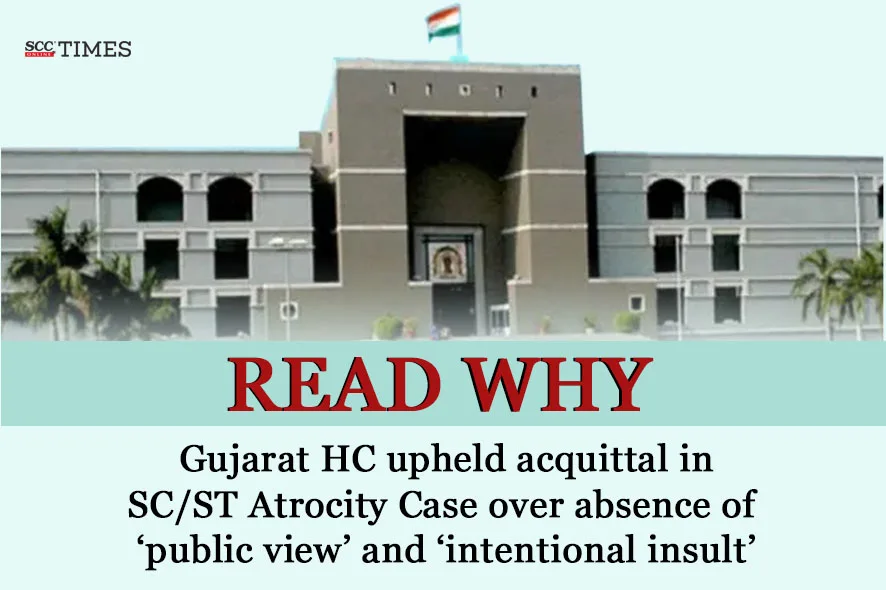Gujarat High Court: The present criminal appeal was filed by the appellant under Section 378 of the Criminal Procedure Code, 1973 (‘CrPC’) challenging the order of acquittal (‘impugned order’) of the respondents-accused passed by the Additional Sessions Judge, 2nd Fast Track Court, Deesa, under Sections 323, 504, 506(2) of the Penal Code, 1860 (‘IPC’) and Section 3(1)(x) of the Scheduled Castes and Scheduled Tribes (Prevention of Atrocities) Act, 1989 (‘Atrocities Act’).
A Single Judge Bench of J.C. Doshi*, J., upheld the Trial Court’s judgment as the complainant and other key witnesses either turned hostile or failed to support the prosecution case. The Court stated that in the present case, possibility of hurt administered to the complainant defined under Section 3(1)(x) of the Atrocity Act was not possible because there was no public view as no third persons were present on the spot, apart from the complainant, his wife and the accused. The Court thus, found no reason to interfere in the impugned order.
Background
In the matter in hand, a complaint was lodged stating that on 4-9-2007, the accused drove a tractor to the area dominating by the people of SC/ST community and spoke filthy language to the complainant on his caste, passed threat of dire consequences and had also, beaten the complainant. In pursuance of complaint, the investigating agency recorded statements of the witnesses, drew panchnama of scene of offence, discovery and recovery of weapons and obtained FSL report etc, and later framed charges. Further, upon committal of the case to the Sessions Court (trial court), accused pleaded not guilty and claimed to be tried.
Analysis, Law and Decision
The Court noted that key prosecution witnesses, including the complainant, his wife, and another villager, turned hostile. The complainant denied being assaulted or abused, though, in a limited context, supported that he was derogated by cast-based remarks. Importantly, he confirmed that no one else was present at the scene except he, his wife, and the accused.
The Court referred to Georige Pentaiah v. State of A.P., (2008) 12 SCC 531, wherein the Supreme Court while explaining the provision of Section 3(1)(x) of the Atrocities Act, held and observed that the complainant ought to allege that accused was not member of SC/ST caste and he was intentionally insulted or intimidated by the accused with intent to humiliate in place within public view. The Court stated that in the present case, there was no public view as no third persons were present on the spot, apart from the complainant, his wife and the accused; and therefore, even if, it was believed that certain words were spoken to derogate the complainant on his caste, he failed to prove that it was intentional.
Further, the Court states that the injury claims were unsupported by medical evidence. The complainant neither took treatment nor was any injury corroborated by medical documents. The Court stated that the entire evidence failed to bring the case within four corners of “with intent to cause alarm to the complainant”. The Court observed that findings of the trial court indicate sheer contradiction and improvisation in the deposition of star witnesses and became root cause to stultify the prosecution case.
The Court referred to Ramesh Babulal Doshi v. State of Gujarat, (1996) 9 SCC 225, and opined that in an acquittal appeal if other view was possible, then also, the appellate court could not merely substitute its view by reversing the acquittal into conviction, unless the findings of the trial Court were perverse, contrary to the material on record, palpably wrong, manifestly erroneous or demonstrably unsustainable. The Court stated that in the present case, it was not shown how the findings recorded by the Trial Court were perverse.
Thus, the Court dismissed the appeal and held that it found no reason to interfere with the Trial Court’s decision.
[State of Gujarat v. Laxmanji Sadaji Thakor, 2025 SCC OnLine Guj 2755, decided on 5-7-2025]
Advocates who appeared in this case :
For the Appellant: Addl. Public Prosecutor Asmita Patel
For the Respondents: Advocate R.H. Thakker and Advocate V.R. Halani



Good observation by the court and a good sign too.